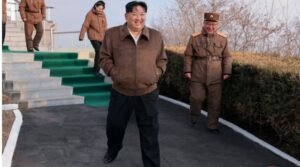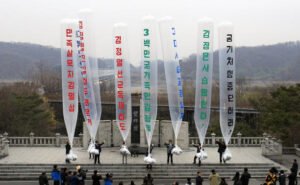North Korea Sends Trash-Filled Balloons Over South Korea
Don’t look up! South Korean residents along the border with North Korea received an unusual warning this week: an “air raid” was underway, but instead of missiles, it was balloons carrying trash and feces. This bizarre incident highlights the latest escalation in the ongoing tit-for-tat actions between North and South Korea.
South Korea Issues Alerts as Poop Balloons Detected

On Tuesday night, more than 150 balloons were detected floating over South Korea, carrying plastic bottles, batteries, shoe parts, and feces. South Korean authorities issued an emergency alert, advising people to avoid outdoor activities and report any suspicious objects to the military. These balloons traveled as far as South Gyeongsang Province, over 180 miles from the demilitarized zone.
North Korea Retaliates Against Anti-Kim Propaganda
The South Korean military, working with local police, began collecting and analyzing the materials, warning residents to stay clear of the droppings. North Korea’s vice minister of national defense had previously promised retaliation against anti-Pyongyang leaflets sent from South Korea. True to their word, they sent the waste-filled balloons, a tactic not seen since a similar event in 2016 when North Korea sent balloons with cigarette butts and used toilet paper.
Rising Provocations Amid Failed Satellite Launch
This latest balloon episode underscores a deeper conflict. Earlier this month, North Korean defectors in South Korea sent large balloons carrying leaflets and USB sticks with K-pop content into North Korea, aiming to undermine Kim Jong Un’s regime. North Korea considers these actions as psychological warfare and has vowed to respond with even more rubbish-filled balloons.
North Korea’s Response to Regional Summit
The trash-filled balloons arrived amid a flurry of North Korean provocations, including a failed satellite launch and the firing of 10 short-range ballistic missiles. Experts suggest these actions are in response to a recent trilateral summit between China, South Korea, and Japan, which addressed Kim Jong Un’s nuclear arsenal and called for the denuclearization of the Korean Peninsula. This summit, which included North Korea’s ally China, likely irked Kim Jong Un, leading to the increased provocations.
North Korea’s “Grey Zone” Tactics
The balloon attacks serve as a low-risk method for North Korea to express its displeasure without escalating into full-blown military conflict. These “grey zone” tactics are hard to counter but less likely to lead to uncontrollable escalation, according to experts like Peter Ward of the Sejong Institute.

Strained Relations with China
Pyongyang’s relationship with Beijing also seems strained. Although China has condemned North Korea’s nuclear tests and supported sanctions, its recent participation in the summit and agreement on denuclearization may have been seen as a betrayal by North Korea. Yang Moo-jin, president of the University of North Korean Studies in Seoul, noted that North Korea might be showing its discomfort towards China’s stance.
North Korea’s Growing Ties with Russia
Meanwhile, North Korea is deepening its ties with Russia. Recent technological advancements in North Korea’s failed satellite launch suggest Russian influence, possibly in exchange for North Korean weaponry to support Russia’s efforts in Ukraine. This growing relationship could further isolate North Korea from its traditional allies.
Kim Yo Jong Defends North Korea’s Actions
Kim Yo Jong, the powerful sister of Kim Jong Un, defended the balloon attacks as a “genuine ‘gift of sincerity’” and mocked South Korea’s claims of freedom of expression for its activists. She promised that North Korea would continue retaliating with even more waste-filled balloons if South Korea persisted with its leaflet launches.
Shift from Propaganda to Waste Balloons
North Korea’s shift from propaganda leaflets to waste-filled balloons reflects a change in strategy. According to Jacco Zwetsloot of the NK News Podcast, this tactic aims to portray South Koreans as unworthy of future unification, reinforcing North Korea’s narrative of permanent hostility towards the South.

Concerns Over Further Escalation
This increase in hostile actions and rhetoric raises concerns about further escalations. North Korea’s recent laws, which solidify its nuclear status and authorize pre-emptive strikes, signal a more aggressive stance. Despite these tensions, analysts suggest North Korea’s provocations might be a calculated effort to remain relevant on the international stage, especially with the upcoming U.S. elections.
International Community Watches Closely
As tensions rise, the international community remains watchful, hoping that these provocations remain limited to trash-filled balloons rather than missiles.












Comments 1